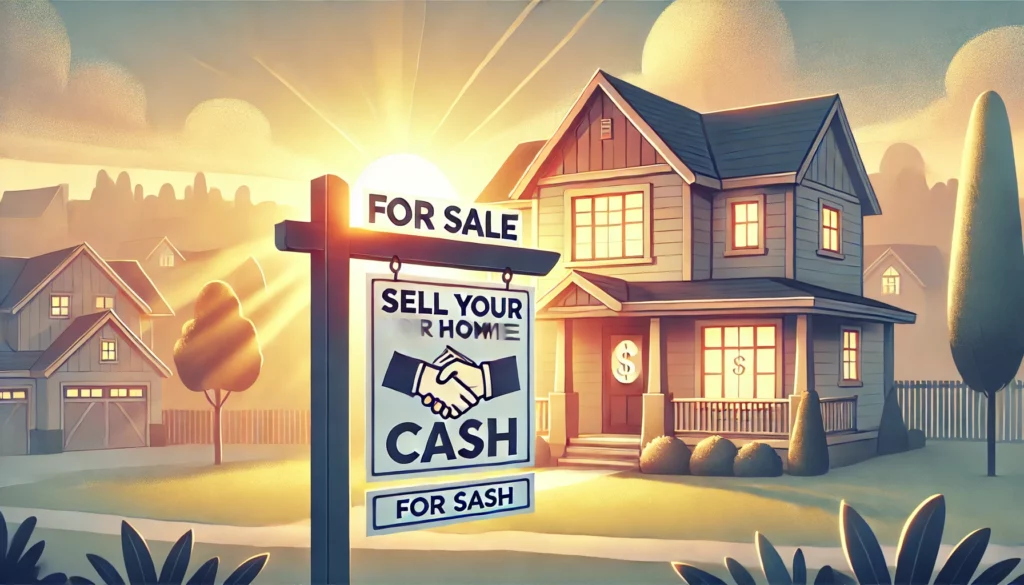Introduction
When you’re searching for “Selling a Home for Cash After a Loss,” you’re likely feeling a sense of overwhelm. The loss of a loved one or facing a major life change is emotionally and mentally exhausting. Add to that the stress of managing an estate or dealing with a house that may not be in the best shape, and the whole process can feel daunting. You’re probably asking yourself, “How can I simplify this? What are my options? What will it cost, and what are the benefits of selling for cash?”
You might also be wondering if the traditional route of selling through an agent is your only option, or if you can get a fair deal without needing to make repairs. There’s likely a mix of emotional and financial concerns: managing debts, the upkeep of an inherited home, or trying to avoid the hassle of probate. If this is the situation you’re in, this blog will walk you through everything you need to know—addressing concerns, offering realistic options, and explaining why selling for cash may be the most beneficial option for you. By the end of this blog, you’ll have a clearer understanding of your choices, with the ultimate goal of reducing the stress involved in selling after a loss.
Why Selling a Home for Cash After a Loss Could Be Your Best Option

When a loved one passes, the last thing you want to worry about is managing their property, especially if it comes with costly repairs or financial burdens. Selling a home for cash is often the simplest, quickest, and most efficient option. But why is this the case?
The emotional weight of dealing with a home after a loss can be overwhelming. The house might require extensive repairs, or it could be filled with belongings that need to be sorted through. A traditional sale can take months, leaving you with additional financial strain during an already difficult time. Selling for cash means you avoid many of these complexities and have the ability to close quickly—often in as little as a week or two. You won’t have to deal with agents, buyers who back out, or spending money on home improvements to make the property market-ready.
Understanding the Probate Process and How It Impacts the Sale of a Home
Selling a house after a loss often involves navigating the probate process. Probate is the legal procedure where a court oversees the distribution of assets of someone who has passed away. It can be time-consuming, confusing, and expensive, depending on the complexity of the estate.
For some, the probate process feels like an additional weight. The idea of dealing with court hearings, attorney fees, and the general red tape can make an already difficult situation seem insurmountable. Can You Sell a Home Without Probate in Maryland? In some cases, the answer is yes. Some states, including Maryland, allow small estates to bypass the full probate process, simplifying the sale of a home. However, if probate is necessary, it could delay the sale of the house and add extra costs.
When you sell a home for cash, you have a distinct advantage: cash buyers typically buy homes “as-is” and can work with your attorney to navigate the probate process efficiently. This is a huge benefit for those dealing with the probate process, which can drag on for months or even years.
The Simplifying the Probate Process in Watertown NY can be especially beneficial if you’re looking to sell the property quickly without waiting for the full probate proceedings to conclude.
If you want to learn more about the probate process and how it impacts your sale, check out Simplifying the Probate Process in Watertown NY.
Selling a Home ‘As-Is’ After a Loss: The Financial Benefits

One of the biggest advantages of selling a home for cash after a loss is the ability to sell “as-is.” This means you don’t have to worry about making repairs, updating the home, or even cleaning out the property. When you’re mourning a loss, the thought of putting money into repairs or cleaning out an entire home is often overwhelming. A cash buyer will purchase the home in its current condition, regardless of how outdated, damaged, or cluttered it may be.
In fact, a traditional sale typically requires significant investments in repairs and staging. This might include things like fixing a leaking roof, repainting walls, or even renovating outdated kitchens and bathrooms. The cost of these repairs can add up quickly, potentially reducing your profit margin from the sale. In some cases, the cost to repair a home can easily exceed $10,000, depending on the size and condition of the property.
Selling a home “as-is” helps you avoid these unexpected costs. Selling a Home ‘As-Is’ After a Loss in New York provides an excellent example of how this can work. In New York, many sellers find that their houses are outdated or in need of significant repair. When selling for cash, you can bypass this entire process and move forward with the sale without worrying about making repairs.
Learn more about selling a home “as-is” by reading Selling a Home ‘As-Is’ After a Loss in New York.
How Quickly Can You Sell a Home After a Loss?
Timing is everything when it comes to selling a home after a loss. The more time that passes, the more difficult it can be to maintain the property, especially if it’s empty. Cash buyers offer the benefit of speed—they can close in as little as seven to 14 days, compared to the months it could take to go through a traditional listing process.
The quicker you sell, the less time you have to pay for property taxes, insurance, and maintenance. When dealing with a property that is no longer a primary residence, these costs can quickly add up. For example, if you’re paying an additional $1,000 per month in maintenance and utilities, that’s $12,000 a year spent on a property you no longer need.
This quick turnaround can be especially beneficial in Steps to Sell an Estate Home in Pennsylvania where heirs may want to sell quickly to settle debts or divide the estate. By selling for cash, you can close in a fraction of the time it would take if you went through a traditional sale, freeing up time and resources for other estate matters.
For more information on the steps involved in selling an estate home, check out Steps to Sell an Estate Home in Pennsylvania.
Weighing the Pros and Cons: Should You Sell for Cash or Use a Traditional Agent?
When it comes to selling a home after a loss, you’re faced with several choices. Should you go the traditional route and hire a real estate agent? Or does it make more sense to sell for cash? Here are some important points to consider.

Pros of Selling for Cash:
- Quick Sale: As mentioned, a cash sale can close quickly—often in as little as seven to 14 days.
- No Repairs Needed: You won’t need to spend money or time on repairs or renovations.
- Certainty: Cash buyers are typically investors who have the funds available to close, which reduces the risk of deals falling through.
Cons of Selling for Cash:
- Lower Offer Price: Cash buyers typically offer less than market value. This is because they take on the risk of buying a property “as-is” and need to cover repair costs.
- Potential Scams: Some less-reputable investors might try to take advantage of sellers who are under pressure.
When selling a house after a loss, you want to avoid lengthy processes that drag out the situation. A traditional sale might involve commissions (typically 5-6%), repairs, and long wait times, all while still being uncertain about when you’ll actually close. In contrast, selling for cash means you can avoid many of these costs, but at the cost of a slightly lower offer.
How Selling a Home for Cash Can Help You Avoid the Emotional Burden of Repairs
Selling a home for cash after a loss offers much-needed relief, especially when the property is in need of significant repairs. Many homes—particularly older ones or those that have been neglected—require costly renovations to meet market standards. In these situations, it’s common for sellers to feel overwhelmed, particularly after a personal loss, when the last thing they want to do is spend time and money fixing a house.
The emotional burden of maintaining or repairing a home can be just as stressful as the financial burden. Imagine having to deal with the grief of losing a loved one while simultaneously managing contractors, fixing plumbing issues, or replacing a roof that’s been leaking for years. Selling a house “as-is” to a cash buyer eliminates all of these concerns. Cash buyers will typically purchase homes in their current state, meaning you won’t have to make any repairs or even clean up the property before the sale.
This option is especially beneficial for individuals who are dealing with a difficult emotional time and can’t bear the idea of putting more energy into fixing up a property. By selling for cash, you get peace of mind knowing that the sale will be completed quickly and efficiently, without the added pressure of maintaining the property.
If you’re considering selling in Virginia after a loss, it’s worth exploring how to navigate the process specifically in your state. You can learn more about How to Sell a Home After a Loss in Virginia to understand state-specific regulations and strategies.
The Tax Implications of Selling a Home for Cash After a Loss
When selling a home for cash after a loss, it’s important to consider the potential tax implications that may arise. The tax treatment of a home sale depends on various factors, including whether the property is your primary residence or an inherited home, the amount of the sale, and the costs you incurred during the sale process.

For example, if you’re selling an inherited property, there may be capital gains tax concerns. The IRS allows for what’s called a “step-up in basis,” meaning the property’s value is adjusted to its market value at the time of the decedent’s death. This can significantly lower any potential capital gains taxes, as you are only taxed on the profit you make above the stepped-up value.
However, if the home is not a primary residence and you sell it for more than its stepped-up value, you may be subject to capital gains taxes. Selling to a cash buyer doesn’t change this tax responsibility, but it can simplify the process because the transaction is typically quick and straightforward, with fewer complications than a traditional sale.
Additionally, it’s important to keep track of any fees or costs associated with the sale, such as attorney fees or title transfer costs. These can potentially be deducted from the sale proceeds, reducing your taxable income.
Consulting a tax professional is always a good idea when selling a home after a loss to fully understand how the sale will impact your tax situation. Understanding the potential tax implications can help you make a more informed decision about how to handle the sale of your home.
If you’re concerned about selling an inherited property and its implications, consider learning more about how probate might be bypassed in some cases, especially in Can You Sell a Home Without Probate in Maryland?
What Happens if You Can’t Afford to Pay for Repairs or Closing Costs?
One of the most challenging aspects of selling a home after a loss is managing the costs associated with the sale. For many sellers, paying for repairs or closing costs can be a significant burden, especially when the property is in poor condition or if the estate doesn’t have sufficient funds to cover these expenses.
If you find yourself in a situation where you can’t afford to pay for necessary repairs or closing costs, selling to a cash buyer can be an excellent solution. Unlike traditional home sales, where the seller may be expected to pay for repairs or help cover closing costs, a cash sale typically eliminates these financial obligations.
Cash buyers often purchase homes “as-is,” meaning they will take on the responsibility for any necessary repairs. Furthermore, cash buyers generally don’t expect sellers to contribute to closing costs, unlike buyers in traditional sales who may request the seller to pay a portion of those fees. This can save you thousands of dollars and ensure that the sale goes through smoothly without unexpected financial burdens.
For example, in cases where a home has structural damage or outdated appliances, the cost of repairs can easily add up to $10,000 or more. By selling to a cash buyer, you can avoid spending that money and still close the sale quickly.
This flexibility is especially valuable for sellers who are handling an estate or facing financial difficulties. It’s important to remember that selling to a cash buyer is not only about the speed of the transaction—it’s also about minimizing additional costs that could add stress to an already complicated situation.
For more information on how closing costs work in real estate transactions, check out Bankrate’s breakdown of closing costs.
The Risks of Not Selling to a Reputable Cash Buyer
While selling a home for cash offers numerous benefits, it’s essential to be cautious when selecting a buyer. Not all cash buyers are created equal, and there are risks associated with working with unscrupulous investors who may try to take advantage of your situation.

One of the main risks is the potential for receiving a lowball offer. Some less-than-reputable buyers may take advantage of the seller’s emotional state, offering a price that is far below market value. In these situations, the seller may feel pressured to accept the offer quickly without exploring other options. While selling a home “as-is” to a cash buyer typically results in a lower price than a traditional sale, you should ensure the offer is still fair for the condition of the property.
Another risk is dealing with fraudulent or untrustworthy cash buyers who promise a quick sale but then back out at the last minute, leaving you with wasted time and effort. These buyers may also have unclear terms or hidden fees, making the process more complicated than it needs to be.
To avoid these risks, it’s important to do your research and work with reputable, experienced cash buyers. Look for companies with positive reviews and a track record of successful transactions. Be sure to ask for proof of funds before committing to a deal to ensure the buyer has the financial resources to follow through with the purchase.
To learn more about how to choose a reputable cash buyer and avoid scams, the Federal Trade Commission’s guide on avoiding real estate scams provides useful tips.
Conclusion: Why Selling a Home for Cash After a Loss is Often the Best Choice
In conclusion, selling a home for cash after a loss can offer many advantages, from avoiding costly repairs and probate delays to providing a quicker and simpler way to close. The emotional and financial stress that comes with dealing with a property after a loss can be overwhelming. With the flexibility and certainty offered by cash buyers like Sold First, you can alleviate a significant portion of that stress and focus on moving forward with your life.
While there are some trade-offs, such as receiving a lower offer than you might through a traditional sale, the benefits often outweigh the negatives. Cash sales provide relief in times of uncertainty, allowing you to sell a home quickly, without repairs, and without the typical headaches of the real estate market. If you find yourself in a similar situation, selling for cash to Sold First may be the right option for you.

